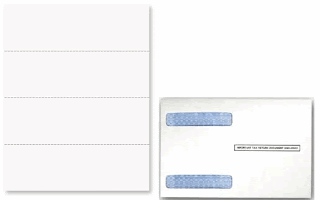
It's Nov. and that means the year end is right around the corner. Don't forget to order all the year end forms and corresponding envelopes to finish your calendar year tax filing requirements. Various businesses need more of some and less of others to meet all the requirements set forth depending on their activities. Some basic forms you may need are:
Federal 941: Employer's Quarterly Tax return
Federal 940: Annual Federal Unemployment
W-3: Transmittal summary sheet that accompanies the Copy A pink forms of the ...
W-2: All copies. You have to send out recipient copies and the pink Copy A's as well as keeping a Payer Copy. Don't forget the envelopes to accompany forms W-2 to employees for their personal tax filing information.
Reminder: The deadline for postmarking W-2 forms to employees and the IRS is January 31st.1099's: There are various 1099's according to what type of monies have been paid. The most common will be the'1099 Misc' used for box 7, Nonemployee Compensation paid to self employed sub contractors and the like. Oh, also box 1, rents paid. Make sure you have the correct spelling and full information for each recipient including their Social Security number or Federal ID number. Don't forget to order window envelopes for the specific style of forms you purchase.
1096: Transmittal summary form to accompany the Copy A to be sent in to the government.
Don't forget to order early, sometimes you can save a bundle on your supplies. And be conservative when ordering, these forms are year specific and cannot be used in later years (or prior years either). January is normally a very hectic month trying to do inventory and keeping up with other various year end reporting as well as staying on track with current regular duties, shopping for year end forms at the last minute and hoping they arrive on time to complete and send in can be more of a hassle than necessary. Order early and your supplies will be waiting for you!
As always, seek professional help if you have any questions or need assistance completing your forms and filing them timely. You may even decide to have an accounting and payroll professional prepare all of your forms for you by providing the final figures to them. This is also a good time to seek a local trustworthy tax and accounting professional in your area in order to secure the help you need. Chances are, they will have their hands full if you wait til the last minute to seek help and you may end up paying late penalties and interest if you do that.
 The sheer volume of entries required to process the accounting alone will cost you big time! There are almost always mistakes made when someone else is trying to figure out whether or not an expense was incurred personally or for the business. You may shop at Sam's, for instance, personally and also for your business supplies. What ends up happening is, the accounting clerk is left to audit every receipt and make decisions and ask a bunch of unnecessary questions...when it is possible for you to write yourself payroll (if that is how you are set up) or a draw check, then pay your personal affairs through your personal accounts.
The sheer volume of entries required to process the accounting alone will cost you big time! There are almost always mistakes made when someone else is trying to figure out whether or not an expense was incurred personally or for the business. You may shop at Sam's, for instance, personally and also for your business supplies. What ends up happening is, the accounting clerk is left to audit every receipt and make decisions and ask a bunch of unnecessary questions...when it is possible for you to write yourself payroll (if that is how you are set up) or a draw check, then pay your personal affairs through your personal accounts.





